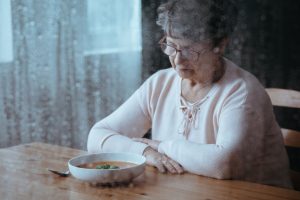Having a proper diet plan is important at all ages, but it is more important among the elderly because it has a significant impact on their health. With age, there are many changes in the body. These changes also affect the nutrition of the elderly and change their nutritional needs. For example, suffering from some diseases, such as cardiovascular problems, makes the elderly unable to eat fatty or sweet foods. Or if they suffer from high blood pressure, consuming salty and sweet foods will be harmful for them. Considering the importance of nutrition, a suitable diet plan should be considered for the needs of the elderly.
What is malnutrition?
Malnutrition is one of the problems that causes great concern for the elderly and their families. Malnutrition occurs when an elderly person’s diet cannot provide enough or balanced nutrients to maintain their health. Inadequate nutrition causes growth delay among children and adolescents and weight loss and wasting in old people. If the body does not get a balanced amount of nutrients, the person becomes malnourished and the result may be obesity and overweight. In this situation, the calorie intake is more than usual and should be treated.
Causes of malnutrition in the elderly
Malnutrition in some elderly is rooted in their lifestyle, conditions, diseases and events that happened during their life. An example is the cognitive changes that lead to malnutrition problems and its consequences.
hearing loss
You may think that hearing problems have no effect on the amount of food and nutrients, but if the elderly cannot participate in the conversation or listen to the conversation during a family gathering, they will not enjoy eating much. Ultimately, this problem leads to malnutrition.
Olfactory disorders
The sense of smell has a great impact on people’s quality of life. From the time we wake up to the time we sleep, we smell many smells. From the smell of bread to the smell of rain and flowers and… Most of our memories are made up of smells. With age, the elderly may also experience disturbances in the sense of smell. One of the effects of smell disorder and its reduction is malnutrition. Because the sense of smell makes up a large amount of tastes, and an elderly person who has olfactory problems cannot understand or choose the tastes well.
Taste problems
To check the impact of the sense of taste on malnutrition, it is not bad to have a look at the function of the tongue and this sense. When we eat food, we chew it, which releases a number of food molecules in the mouth and throat. These molecules reach the sensory cells in the mouth and throat and stimulate them. Stimulated cells send a message to the brain and after analyzing the brain, we recognize the taste.
The amount of taste cells on the surface of the tongue and throat is high and they are regenerated every two or three weeks; This is despite the fact that with increasing age and reaching the age of 50, the sensitivity of cells decreases and they cannot regenerate themselves as before. With the increase in taste problems, the desire to eat also decreases, and in some cases, people with this disorder eat only to get full and have no understanding of its taste.

Mouth and teeth Problems
Mouth and teeth play an essential role in chewing and swallowing food. Usually, with age, the amount of oral and dental problems increases, and it is not the only reason for lack of care; Because at this age, some elderly people take medicines that cause tooth decay and loss. Research shows that more than 60% of people over 65 years of age suffer from oral and dental disease. Elderly people who have lost a large number of teeth cannot follow the same diet as other people. Or an elderly person who has artificial teeth, may avoid eating some fruits such as apples and carrots, vegetables or hard and sticky foods, and this issue will have a great impact on the amount of food intake and their balance.
Decreased physical activity
Naturally, metabolism and energy intake from food decreases in elderly people. If the elderly person avoids movement and exercise, this amount of metabolism will be minimized and he will feel less hungry. In some people, inactivity leads to constipation. With constipation, delay in emptying the stomach, and similar problems, the elderly usually remove some of the foods that are necessary for the body from their food plan. Some of them will also avoid eating fruits and vegetables.
Psychopathy
Placing the elderly in traumatic mental states such as anxiety, dementia, stress, anxiety and worry, depression, etc. It will cause a series of unwanted behaviors, one example of which is overeating or anorexia. You must have seen people who have experienced weight loss due to stress or people who are facing overeating and weight gain due to stress and anxiety. In any case, to prevent problems caused by malnutrition, wasting or obesity that cause serious problems for the elderly, you must first treat their mental disorders.
Drug and food interactions
You must have seen the writings of one hour after food, one hour before food on an empty stomach, etc. on the medicine package. Medicines usually have complex compounds that their untimely use interferes with food consumption. Sometimes the interaction of food and medicine leads to inability to digest, inability to absorb nutrients or loss of appetite. The elderly are a group of people who must be very careful to avoid drug and food interactions, Because they not only use different drugs to treat different problems, but also; Decreased blood flow, decreased body water, decreased muscle mass, increased fat mass, and similar problems provide conditions for drug interactions and nutritional problems in their bodies. For this reason, the elderly should take their medicines on time and have a suitable diet for them. If the family of the elderly is not able to manage his medication and nutrition, they can get help from the elderly nurse.
Other causes of malnutrition in the elderly
The causes of malnutrition are not limited to the ones mentioned above. Social problems, alcohol abuse, some diseases, etc. are other causes of malnutrition.
Diagnosis of malnutrition
In order to help the elderly who are at risk of malnutrition, the problem must first be recognized. One of the diagnosis methods is the MUST screening. Research has proven the reliability of this screening. To perform this screening and diagnose problems, the elderly must go through 5 steps.
1- In the first step, the person’s height and weight are measured and their body mass index is obtained.
2- Then they calculate the percentage of unexpected weight loss of his body.
3- They rate the mental and physical conditions of the elderly.
4- The scores of the previous 3 stages are added together and the risk score is obtained.
5- According to the obtained score, a suitable care plan for the elderly is prepared.
If the obtained score is 0, there is no risk of malnutrition, if it is 1, the risk score is medium and if it is 2, it indicates a high risk of infection.
Consequences of malnutrition in the elderly
The elderly will face many negative consequences when suffering from malnutrition.
• Elderly people suffering from malnutrition will be weaker in dealing with diseases and their treatment will take longer than usual. Also, the wounds in their body will need more time to heal.
• Reduced concentration and memory loss are other complications of having this problem.
• The immune system of malnourished people is usually weaker than normal people, so the possibility of them getting infections and other diseases increases.
• They also experience more fatigue than usual.
Dietary recommendations for the elderly
If you want your senior not to suffer from malnutrition and related problems, it is enough to include some nutrients that the elderly body needs in his food plan. Pay attention to the following points in planning their diet.
Protein foods
Having muscle mass leads to an increase in people’s quality of life, fitness and proper weight. As a result, maintaining and building muscles is very important. Many people experience a decrease in muscle mass due to aging. Decreased muscle mass in the elderly leads to problems such as decreased strength, decreased balance, and difficulty walking. They may also have trouble climbing stairs, doing everyday tasks, and lifting objects. But what should be done to prevent this from happening? The solution is proper nutrition and protein consumption. Consuming proteins strengthens muscles and is essential to prevent muscle loss.
Eggs, fish, white meat, beans, etc. are protein sources that should be included in the diet of the elderly.
Fruits and vegetables
Fruits are rich in vitamins and minerals and their consumption is recommended not only for the elderly but for all age groups. As much as the quantity of fruits and vegetables is important, the variety in their consumption is also important. So your loved ones should consume a wide range of fruits and vegetables to live a better life. On the other hand, the consumption of this group of foods reduces the incidence of some diseases such as cardiovascular diseases, blood pressure, cancer, diabetes, eye and digestive problems and helps the elderly to have a balanced weight.For this reason, it is better to include the right amount of fruits and vegetables in the meal plan and give them as a snack. Apples, kiwis, citrus fruits, melons, papayas, etc. are some of the fruits that are recommended for the health of the elderly.
Consumption of nuts
Nuts are rich in minerals, vitamins, fiber and unsaturated fatty acids. Including these nutrients in the daily and even weekly diet can be effective in maintaining the health of the elderly, so that research has shown that the risk of death among people who eat nuts 7 times a week is about 20% lower than other people.
Among the benefits of consuming nuts for the elderly, the following can be mentioned.
• Reducing the amount of cardiovascular problems
• Keeping the mind active and preventing the problems caused by it
• Prevent overweight
• Prevention of type 2 diabetes
• Reducing joint pain and inflammation
• Reducing the risk of cancer

Eating breakfast
After consuming food at dinner, it takes a long time to eat breakfast. In the morning, the body is ready to receive nutrients such as fibers, protein, various vitamins and minerals, but when breakfast is avoided, these nutrients do not reach the body and may not be compensated in other meals. Eating breakfast makes the elderly to eat a more appropriate amount of food in the next meals and not to become overweight and obese. Eating breakfast will reduce blood sugar fluctuations, have energy, mental performance and focus more.
Encourage the elderly to eat healthy breakfasts and avoid cookies, sweets and croissants as much as possible. It is better to include dates, dried apricots, oatmeal with seeds, tuna with butter, whole wheat toast with olive oil, eggs, tomatoes and cheese in their breakfast.
Varied cuisine
Most people don’t like to eat repetitive foods for several days or in back-to-back meals. On the other hand, it can be said that we eat with our eyes, which means that some of the pleasure and passion of eating is related to the color and glaze of the food and its taste and smell. In any case, aging affects the desire to eat in the elderly. Therefore, it is better to try various and tasty foods in different ways, such as frying, boiling, steaming, frying, etc.
Water consumption
Water is a large part of the human body and all body functions, including excretion and digestion. Its consumption is essential for health and causes better absorption of nutrients and diet. The effect of water consumption in regulating the body’s metabolism cannot be ignored either. If the elderly suffer from malnutrition caused by consuming excess calories, their problem can be solved by drinking water; Because water helps to eliminate and reduce extra calories in meals and snacks.
How to deal with anorexia in the elderly
Some seniors struggle with anorexia. It is necessary to treat anorexia quickly to prevent serious problems and malnutrition. If it has been a while since he suffered from this problem, you can help him recover by using the few points that we will explain below, but if the elderly’s lack of appetite lasts for a long time, it is better to consult an expert about his nutrition. These tips include:
• Prepare a variety of foods for him, the variety of food and the color and glaze of the food are effective in increasing appetite.
• Try to cover some foods with other foods to get the necessary amount of each nutrient.
• Adding a series of food items to the food of the elderly increases appetite.
for example:
• Add powdered milk to natural yogurt and feed it to the elderly.
• You can add vegetables, nuts or dried fruits to yogurt, salad or soup.
• Eggs are rich in ingredients needed for the health of the elderly, you can add it to vegetable soup and feed it to the elderly.
• Adding a little grated cheese to vegetable soup, salad and pasta is effective in increasing appetite



Hi, this is a comment.
To get started with moderating, editing, and deleting comments, please visit the Comments screen in the dashboard.
Commenter avatars come from Gravatar.